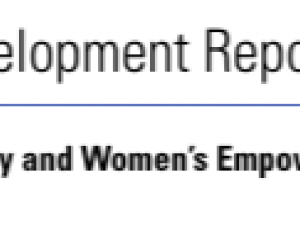Africa Human Development Report 2016 (UNDP) - Accelerating Gender Equality and Women’s Empowerment in Africa
Discussion details

Summary by Skrzynska Marta
The report states that while 61 percent of African women are working they still face economic exclusion as their jobs are underpaid and undervalued, and are mostly in the informal sector.
African women hold 66 percent of the all jobs in the non-agricultural informal sector and only make 70 cents for each dollar made by men. Only between 7 and 30 percent of all private firms have a female manager. In a key finding, the report estimates that total annual economic losses due to gender inequality in the labour market have averaged US$95 billion per year since 2010 in sub-Saharan Africa and could be as high as US$105 billion, or 6 percent of the region’s GDP in 2014.
Social norms are a clear obstacle to African women’s progress, limiting the time women can spend in education and paid work, and access to economic and financial assets. For instance, African women still carry out 71 percent of water collecting translating to 40 billion hours a year, and are less likely to have bank accounts and to access credit.
African women’s health is also severely affected by harmful practices such as under-age marriage and sexual and physical violence, and high maternal mortality - the most at-risk women being those of childbearing age. According to the report, a 1 percentage point rise in adolescent birth rate increases the overall adult female mortality rate by about 1.1 percentage points.
The report proposes four strategic pathways to greater gender equality and women’s empowerment – adopting legal reforms, building national capacity to accelerate women’s involvement in decision-making, adopting multi-sectoral approaches in promoting gender equality and women’s empowerment, and accelerating women’s ownership of assets and management of resources.
The report further recommends six enabling actions to fast-track the achievement of gender equality and women’s empowerment, and by extension, the Sustainable Development Goals and Africa’s Agenda 2063:
- Using gender equality as an organising policy lens for all development planning and implementation to ensure that gender equality and women’s empowerment is a deliberate design feature.
- Directly tackling destructive social norms as African leaders can no longer abdicate from their responsibility to address harmful social norms in a straightforward and unambiguous manner.
- Planning and budget prioritisation for gender equality that foregoes short-term politically and economically expedient decision-making, and instead links immediate priorities to a long-term vision mapping out a more inclusive and empowering development trajectory.
- Ensuring adaptive national institutions to drive a strong, proactive and responsible social framework that develops policies, follows through implementation and readjusts in the face of shifting evidence and the changing needs of society.
- Giving value to data for improved decision-making and informedpolicy change and mid-course corrections. Data disaggregation beyond national-level is critical to gauge impact at regional and local-levels.
- Engaging in regional and South-South Cooperation in designing and implementing gender-focused policies and initiatives to share tools, strategies and experiences across sectors.
Achieving gender equality and women’s empowerment cannot be achieved without forging alliances among development actors – government, civil society, private sector and other development partners.
In this perspective the report proposes two major initiatives, the establishment of an African Women’s Investment Bank and the implementation of Gender Seal certification to promote gender equality standards in workplaces.
Link to the report: http://www.undp.org/content/undp/en/home/librarypage/hdr/2016-africa-hu…
Log in with your EU Login account to post or comment on the platform.